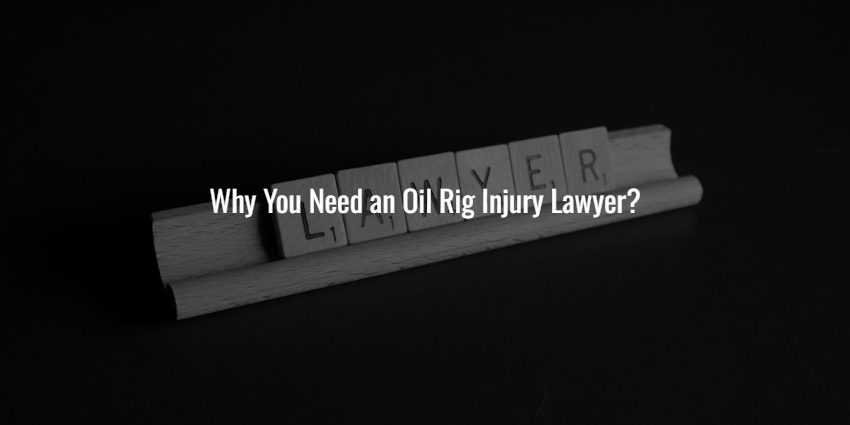Working on an oil rig is no walk in the park. Do you know Why You Need an Oil Rig Injury Lawyer? The dangers are real, and accidents can happen in the blink of an eye. When they do, having an oil rig injury lawyer on your side can make all the difference. These specialized attorneys are experts in navigating the complex legal landscape of oil rig injuries, ensuring you get the compensation you deserve.
Why You Need an Oil Rig Injury Lawyer
Oil rig injury cases are notoriously complex. From the unique hazards of the job to the intricate web of regulations and laws, handling a case on your own can feel overwhelming. This is where an oil rig injury lawyer comes in.
Complexities of Oil Rig Injury Cases
Oil rigs are governed by a mix of maritime and state laws, making these cases particularly challenging. An experienced lawyer knows how to navigate these waters and build a strong case.
Dealing with Insurance Companies
Insurance companies often try to minimize payouts. A skilled lawyer can negotiate with them, ensuring you receive fair compensation.
Understanding Oil Rig Regulations
Oil rigs operate under strict safety regulations. A knowledgeable lawyer can identify any violations that may have contributed to your injury.
Qualities to Look for in an Oil Rig Injury Lawyer
Not all lawyers are created equal. Here are some qualities to look for when choosing the right attorney for your case.
Experience and Expertise
Look for a lawyer with extensive experience in oil rig injury cases. They should have a deep understanding of the laws and regulations that apply to your situation.
Track Record of Success
A proven track record of successful cases can give you confidence in your lawyer’s abilities.
Communication Skills
Your lawyer should keep you informed every step of the way. Clear communication is key to a successful attorney-client relationship.
Client Testimonials
Reading reviews from past clients can provide valuable insights into a lawyer’s effectiveness and client satisfaction.
Steps to Take After an Oil Rig Injury
Knowing what to do immediately after an injury can protect your rights and strengthen your case.
Ensure Safety and Seek Medical Attention
Your health is the top priority. Ensure you’re safe and seek medical attention immediately, even if injuries seem minor.
Document the Scene and Gather Evidence
If possible, document the scene of the accident. Take photos, gather witness statements, and note any safety violations.
Notify Your Employer
Report the injury to your employer as soon as possible. This step is crucial for filing a claim.
Contact an Oil Rig Injury Lawyer
Reach out to a lawyer immediately. They can guide you through the next steps and start building your case.
How an Oil Rig Injury Lawyer Can Help
An oil rig injury lawyer provides invaluable assistance in several ways.
Investigating the Accident
Your lawyer will conduct a thorough investigation, gathering evidence to support your claim.
Negotiating with Insurance Companies
They’ll handle negotiations with insurance companies, aiming to secure a fair settlement.
Representing You in Court
If a settlement can’t be reached, your lawyer will represent you in court, fighting for your rights.
Securing Fair Compensation
The goal is to ensure you receive compensation for medical expenses, lost wages, pain and suffering, and more.
Types of Compensation You Can Claim
Understanding the types of compensation available can help you know what to expect.
Medical Expenses
Compensation should cover all medical costs related to the injury, including future treatment.
Lost Wages
If you’re unable to work due to your injuries, you can claim lost wages for the time you miss.
Pain and Suffering
This includes compensation for physical pain and emotional distress caused by the injury.
Rehabilitation Costs
Compensation should also cover any rehabilitation or therapy needed for your recovery.
Why Oil Rig Injuries Occurs
Understanding common causes can help in identifying who is at fault.
Falls and Slips
The slippery and uneven surfaces on oil rigs make falls and slips common hazards.
Equipment Failures
Malfunctioning or poorly maintained equipment can lead to serious injuries.
Explosions and Fires
The presence of flammable materials makes oil rigs prone to explosions and fires.
Heavy Machinery Accidents
Working with heavy machinery poses significant risks, and accidents can be devastating.
Understanding Liability in Oil Rig Injuries
Determining liability is crucial in an oil rig injury case. Multiple parties can be held responsible.
Employer Liability
Employers can be held liable if they failed to provide a safe working environment.
Third-Party Liability
Equipment manufacturers or contractors may also be held responsible if their negligence contributed to the injury.
Shared Liability
In some cases, multiple parties share the liability for the accident.
Proving Fault in an Oil Rig Injury Case
Proving fault requires solid evidence and expert testimonies.
Gathering Evidence
Collecting evidence from the scene, such as photos and witness statements, is crucial.
Witness Testimonies
Witnesses can provide valuable insights into how the accident occurred.
Experts in oil rig operations can testify about safety standards and violations.
Accident Reconstruction
This involves recreating the accident scenario to understand how it happened.
The Legal Process for Oil Rig Injury Claims
Understanding the legal process can help you know what to expect.
Filing a Claim Oil Rig Injury Case
Your lawyer will file a claim against the responsible parties.
Discovery Phase of Oil Rig Injury Case
During discovery, both sides gather and exchange evidence.
Settlement Negotiations
Most cases are settled out of court through negotiations.
Going to Trial of Oil Rig Injury Case
If a settlement isn’t reached, the case goes to trial.
Tips for Working with Your Oil Rig Injury Lawyer
Working effectively with your lawyer can strengthen your case.
Being Honest and Transparent with Your Oil Rig Injury Lawyer
Honesty is crucial. Share all details, even if they seem insignificant.
Keeping Records and Documentation
Keep all documents related to the accident and your injuries.
Staying Informed About Your Case
Stay in touch with your lawyer and ask for updates regularly.
Following Legal Advice
Trust your lawyer’s expertise and follow their guidance.
Frequently Asked Questions About Oil Rig Injury Lawyers
What Should I Do Immediately After an Oil Rig Injury?
Ensure safety, seek medical attention, document the scene, and contact a lawyer.
How Much Does an Oil Rig Injury Lawyer Cost?
Many work on a contingency fee basis, meaning they only get paid if you win.
How Long Will My Case Take?
It varies, but your lawyer can give you an estimate based on the specifics of your case.
Can I Handle My Case Without a Lawyer?
It’s possible, but not recommended due to the complexities involved.
What if My Employer Denies Liability?
Your lawyer can gather evidence to prove liability and fight for your rights.
Conclusion
Oil rig injuries can turn your life upside down, but you don’t have to face this challenging time alone. A skilled oil rig injury lawyer can be your advocate, helping you secure the compensation you deserve and providing peace of mind.




















